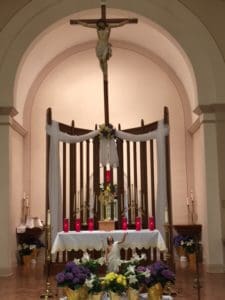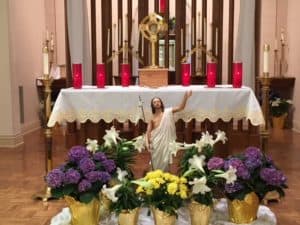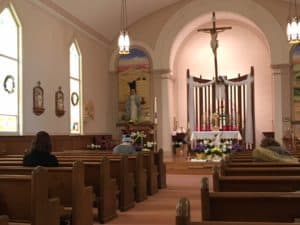The Third Sunday of Easter Franciscan Gospel reflection and questions are written by Fr. Paul Gallagher, OFM. They are edited by Franciscan Sister of Christian Charity Sister Anne Marie Lom and Joe Thiel. The excerpts from the Sunday readings are prepared by Joe Thiel. If you would like to read or download the complete pdf with excerpts for your prayer, please click here: Franciscan Gospel Reflection April 15 2018 Excerpts from the Lectionary for Mass for Use in the Dioceses of the United States of America, second typical edition © 2001, 1998, 1997, 1986, 1970 Confraternity of Christian Doctrine, Inc., Washington, DC. Used with permission. All rights reserved. No portion of this text may be reproduced by any means without permission in writing from the copyright owner. Please include this information when printing.
Photos: St. Anne Parish, Chassell, Michigan
Luke 24:35-48
Then the two recounted what had taken place on the way and how he was made known to them in the breaking of the bread. While they were still speaking about this, he stood in their midst and said to them, “Peace be with you.” But they were startled and terrified and thought that they were seeing a ghost. Then he said to them, “Why are you troubled? And why do questions arise in your hearts? Look at my hands and my feet, that it is I myself. Touch me and see, because a ghost does not have flesh and bones as you can see I have.” And as he said this, he showed them his hands and his feet. While they were still incredulous for joy and were amazed, he asked them, “Have you anything here to eat?” They gave him a piece of baked fish; he took it and ate it in front of them. He said to them, “These are my words that I spoke to you while I was still with you, that everything written about me in the Law of Moses and in the prophets and psalms must be fulfilled.” Then he opened their minds to understand the scriptures. And he said to them, “Thus it is written that the Messiah would suffer and rise from the dead on the third day and that repentance, for the forgiveness of sins, would be preached in his name to all the nations, beginning from Jerusalem. You are witnesses of these things.”
Background
Last week’s gospel was taken from John’s account of Jesus’ appearance to the disciples after the resurrection. In last week’s text he appeared to the disciples twice. The first time Thomas was not present. The second time Thomas was present with the others. The text for this week is from Luke’s account. The texts that the Church has chosen for the Easter Season might give the impression that the timeline of the gospels parallels our own timeline, but that is not the case. Here Luke is describing events that took place soon after Jesus’ appearance to the disciples on the road to Emmaus (Luke 24:13-32). As Luke describes the encounter of the two disciples with Jesus, he tells his readers that it was on “that very day” that the women, Peter, and the beloved disciple had all been to the tomb and discovered it empty. Today’s gospel follows the account of some disciples’ encounter with Jesus on the road to Emmaus. The first line here refers to those disciples telling the others of their experience of Jesus on the road and the breaking of the bread.
The text describes Jesus’ appearance to a rather sizable gathering of disciples. In verses 33-34, not part of the text for today, Luke states, “So they set out at once and returned to Jerusalem where they found gathered together the eleven and those with them
who were saying, ‘The Lord has truly been raised and has appeared to Simon!’”
Here Jesus greets them with the customary greeting of the day, “Peace be with you.” They are startled and terrified, even thinking that Jesus might be a ghost. Jesus first tries to assure them that he is real by inviting them to touch him, and then by eating fish. Having reassured them of his corporal reality, Jesus reassures them that he is truly the promised one. He refers to passages in the Law, the Prophets, and Psalms that point to his suffering and death. Their minds are opened to the profound meaning of their religious tradition. Luke does not tell the reader which passages Jesus referred to that day. Again, Jesus greets them with “Peace be with you.” His reaction to their fear and lack of faith is to demonstrate his physical presence and show them that he is the same person who was betrayed, condemned, and crucified. He also reminds them of his instructions to them. Jesus also makes clear to them that they are to be his witnesses. This commission to witness has been fulfilled already by the fact that two of them had returned from Emmaus with the news of what had taken place.
Reflection Questions
1. Have there been occasions when your emotions have been all over the place? (startled, terrified, filled with doubt and questions, joyful, amazed)
2. How does having questions or being troubled affect your relationship with those close to you? Is that also true for your relationship with God?
3. Are there scripture passages that have brought meaning or comfort to you in difficult times?
4. What would have been some of the possible emotions of the those gathered as the two told of their experience on the road to Emmaus?
5. What do you think would have been your response if you were one of those hearing of their experience on the road?
6. Jesus invites those present to see and touch the wounds of the crucifixion. Is it important to you that Jesus’ risen body still carries the wounds of the crucifixion?
7. Are there people in your parish, community, or family who need to know that Jesus is real?
8. At the end of the gospel text, Jesus tells them “you are witnesses of these things.” How do you respond to these words of Jesus?
9. Can you take some time today to talk with God about this gospel text, Jesus’ desire to show the disciples that he is real, his statement that they are his witnesses, or some other aspect of your relationship with God that arises from this text?





